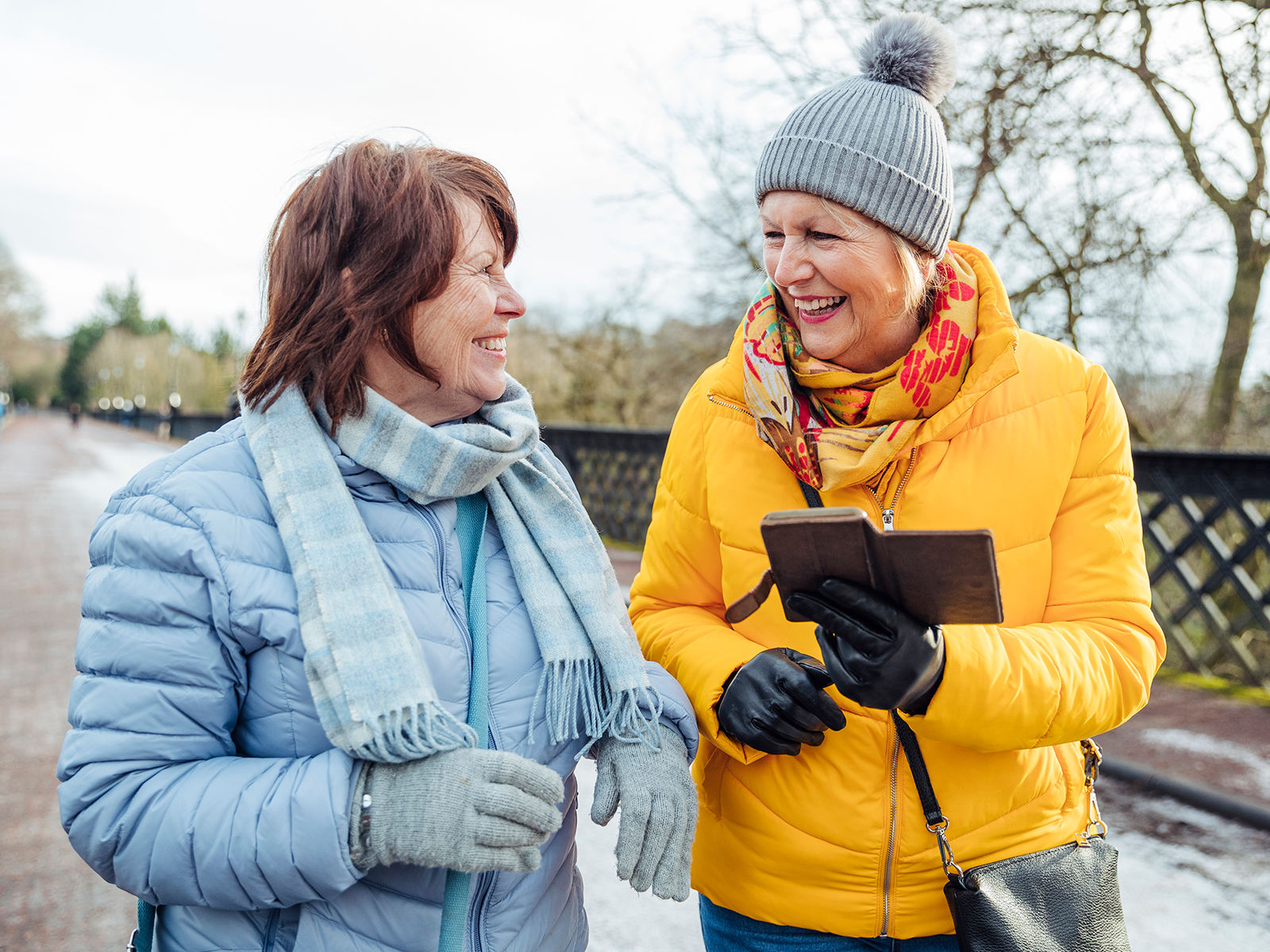Prevent falls on icy surfaces and stay safe, warm and healthy until spring.
1. Prevent falls
Falling on ice or snow can cause serious injury regardless of age.
But as we grow older, our muscles become weaker, bones more brittle and reaction time slower. Older adults commonly experience vision problems, foot pain and decreased balance and mobility. Recovery from illnesses and injuries also takes longer.
All of this is why it’s imperative for seniors to take extra precautions during the winter months to prevent a weather-related fall.
- Consider delivery services for groceries, prescriptions and other necessities.
- Invest in nonskid, rubber-soled, low-heeled footwear.
- Avoid shoveling snow and ice yourself. Older adults have a higher risk of heart attack while shoveling snow. Seek help from your support network (i.e., family, friends or neighbors) to keep your walkways clear.
- Have your vision tested regularly.
- Walk cautiously with short steps.
- Be aware of your surroundings. Make sure outdoor areas are well-lit.
- Use handrails when available.
- If you use a walking aid, dry the wheels or tips before entering your home.
- Keep your home’s entryway clear to avoid slipping on a loose rug or tripping on clutter.
- Get help entering and exiting vehicles.
- Consider improving your balance and muscle strength through exercise.
- Stay indoors during bad weather.

2. Dress warmly
Winter’s chill can be harsh, but proper layering helps insulate your body to stay cozy and warm.
- Begin with a thermal base layer (think “long underwear”).
- Follow with a warm sweater to retain body heat.
- Top off with a waterproof jacket to shield yourself from wind and rain.
- Accessorize with a hat, gloves and scarf to protect all exposed areas.
3. Be aware of hypothermia
Hypothermia happens when your body’s temperature drops below 95 degrees Fahrenheit when exposed to cold temperatures. Hypothermia can lead to serious health issues like an irregular heartbeat and organ damage.
If you show several of the following signs of hypothermia, call 911 right away and move to a warmer place, make a warm drink and wrap in dry blankets, towels or coats.
- Cold feet and hands
- Puffy or swollen face
- Pale skin
- Shivering or shaking
- Slowed or slurred speech
- Feeling sleepy, angry or confused

5. Prepare your home
An ounce of prevention is worth a pound of cure. Get ready for winter in the fall.
- Schedule a professional check-up of your furnace or heating system.
- Seal drafty doors and windows.
- Set your thermostat to at least 68 degrees Fahrenheit. Even home temperatures of 60 to 65°F can lead to hypothermia in older adults.
- Have extra blankets and warm clothing on hand.
- Stay stocked with extra food and essential medications.
6. Create a winter emergency plan
Having a winter backup plan puts your mind at ease because you’ll know exactly what to do if there’s a bad storm and/or power outage.
- Write down the name and contact information of a nearby family member or friend who can check in on you.
- Make sure at least one person in your support network has a key to your home, knows where you keep emergency supplies and knows how to use lifesaving equipment or medicine as needed.
- Keep your cell phone fully charged.
- Have battery-operated flashlights on hand.
- Plan to stay with family or friends when you know a bad storm is on its way.
- Consider the benefits of a temporary winter stay.
7. Be aware of generator safety
Generators can be a big help during power outages. But improper use can lead to carbon monoxide poisoning and electrocution.
- Be certain you know how to operate your generator safely before the need arises.
- Never use a portable generator, grill or camp stove inside your home, basement, shed or garage, even if doors and windows are open.

8. Exercise caution on the roads
- If you must drive, monitor weather conditions and road closures carefully to avoid hazardous situations.
- Rely on local TV and radio news for the most accurate, up-to-date weather-related information in your area.
- Keep an emergency kit in your car that includes a blanket, flashlight, water and non-perishable snacks.
- When in doubt, stay home.
9. Protect your health
Winter is cold and flu season. Plus, many chronic health conditions and prescription medications can lower body temperature and affect circulation. Be prepared.
- Stay up to date on vaccinations.
- Consult your healthcare provider about conditions or medications that might impact your body heat and what you can do.
- Practice good hand washing hygiene.
- Eat healthy, nourishing foods and drink plenty of liquids.
- Avoid contact with people who are sick.
- Consider wearing a protective face mask in crowded indoor spaces like grocery stores, hospitals, doctor’s offices and movie theaters.
Regardless of the temperature outside, the atmosphere inside a Holiday Senior Living community is always warm, safe and friendly.
Find a community near you and schedule a visit. After your tour, you may choose to give up your winter worries and spend a carefree season with us!
*Advice and tips to help you live your best life are brought to you by Lively by Best Buy Health. And remember, get help at the touch of a button with Lively Mobile Plus. Holiday offers residents support beyond the community through the wearable Lively™ Mobile Plus GPS device – because we know accidents can happen anywhere.
You might also like
Want to learn more about life at Holiday?

